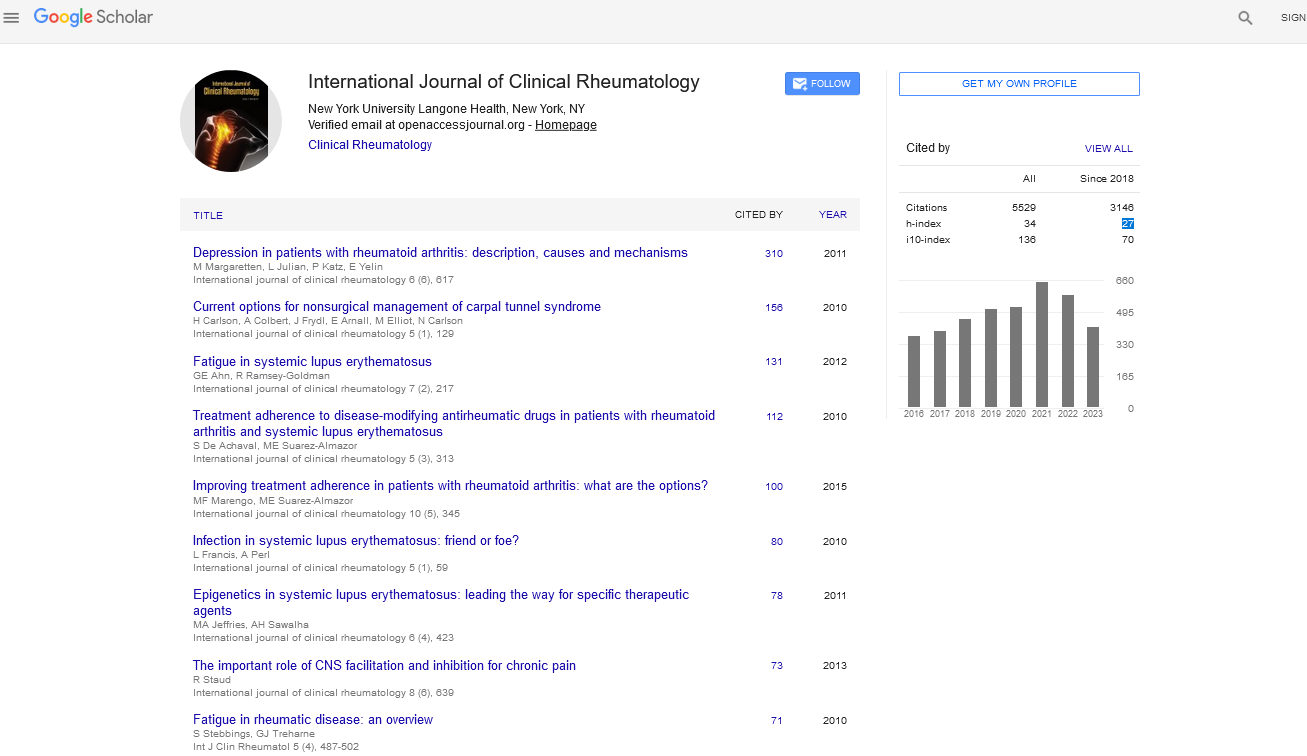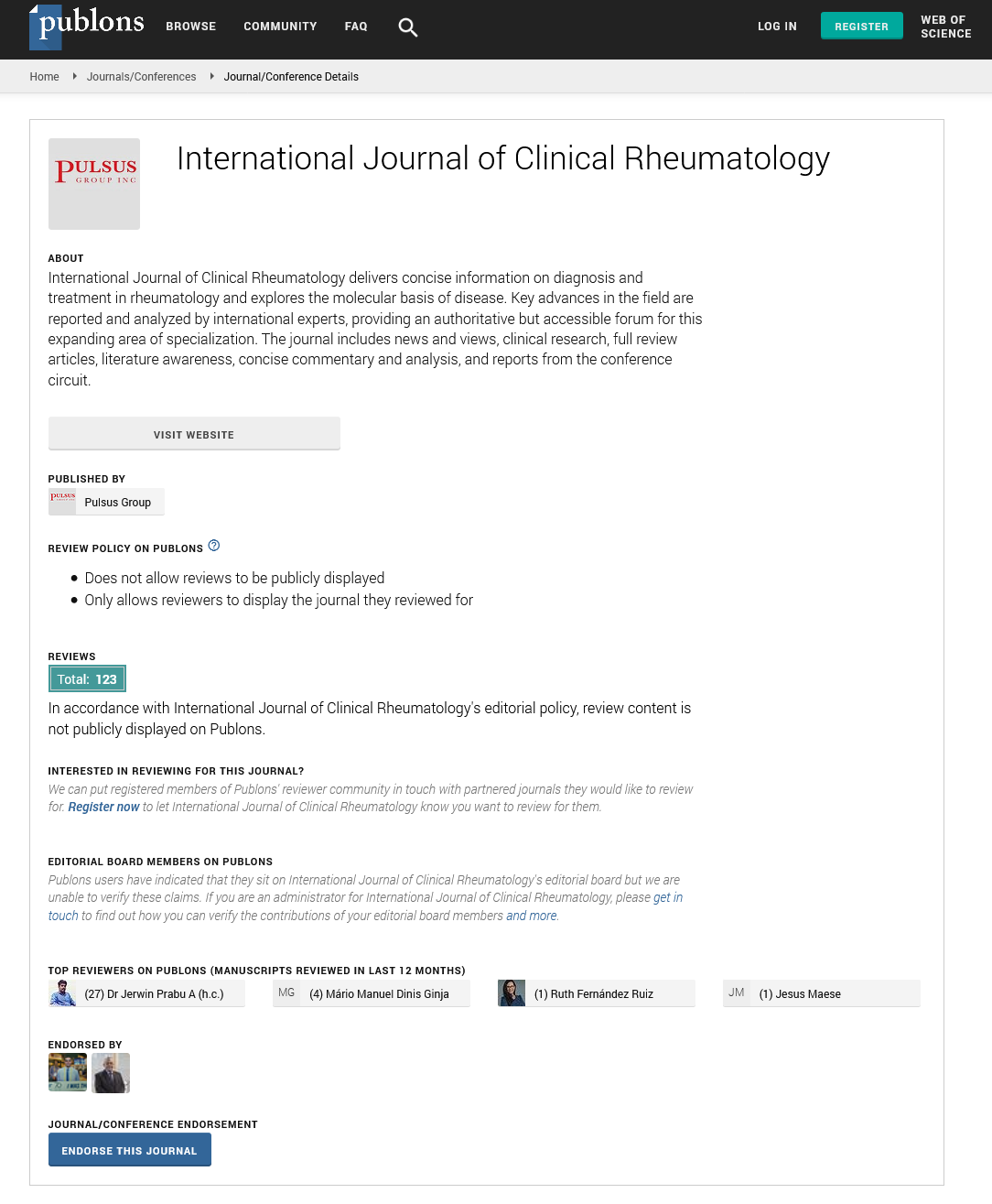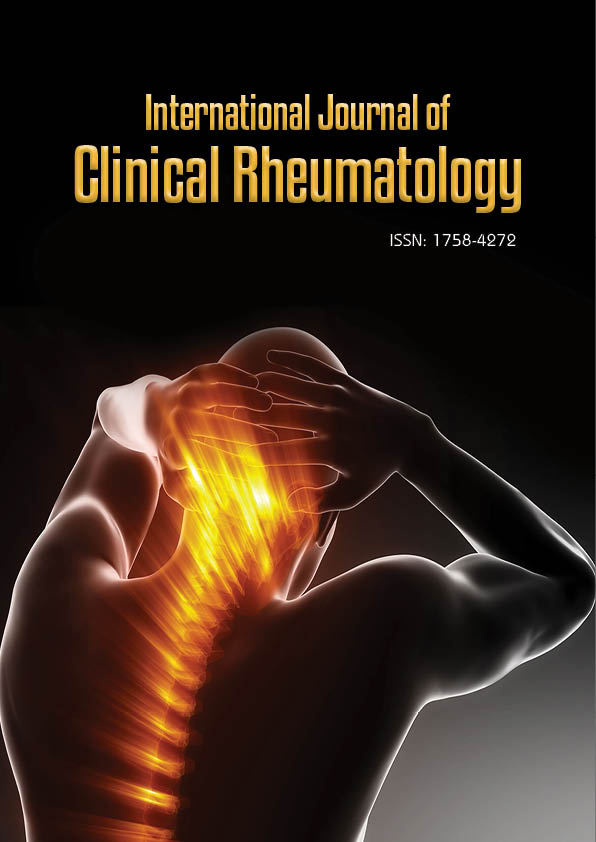Review Article - International Journal of Clinical Rheumatology (2022) Volume 17, Issue 12
Relevance of serum monoamine neurotransmitter, clinical symptoms, and fibromyalgia in individuals with autoimmune disorders
Henry Victor*
Department of clinical rheumatology Jordan
- *Corresponding Author:
- Henry Victor
Department of clinical rheumatology Jordan
E-mail: henry_v@gmail.com
Abstract
Aim of the work
To estimate humour level of monoamine neurotransmitter in autoimmune disorder (RA) patients and study its relation with varied clinical information, photography scores and fibromyalgia.
Patients and strategies
This study concerned eighty RA patients divided equally in line with autoantibody (RF) positivism. changed Health Assessment form, unwellness activity score in 28-joints (DAS 28), visual analogue scale of pain, Short kind Health Survey for mental and physical health, fibromyalgia form, RA articular harm score and tomography joint harm by van der Heidi modification were assessed. Humour level for monoamine neurotransmitter was measured for all patients.
Conclusion
Serum monoamine neurotransmitter level was high in RA, particularly in seropositive patients. It incontestable central medicine and peripheral pro-inflammatory role. The selective-serotonin reuptake inhibitor may well be of profit solely in RA with FMS.
Keywords
Rheumatoid arthritis • Serotonin • Rheumatoid issue positivity • Fibromyalgia
Introduction
Rheumatoid Arthritis (RA) may be a chronic unwellness that may cause pain, joint destruction, loss of perform, and poor quality of life. In RA the association between fatigue and pain had been well established. Fatigue may be influenced by varied factors, like inflammation, pain, disability, and psychosocial factors area unit predictors of additional severe unwellness forms and better tendency to develop extra-articular manifestations [1]. It’s been shown that a progressive decrease within the RF levels parallels the decrease of clinical activity in patients treated with ancient wellness modifying anti-rheumatic medication or biological agents. The magnitude of symptoms might not essentially correlate with the severity of the underlying unwellness and symptoms might persist even once unwellness exacerbations have apparently settled. Fibromyalgia will occur secondary to several inflammatory conditions and therefore the frequency in Egyptian RA patients was calculable to be Bastille Day with a doable association to calciferol deficiency [2]. it's of predominate importance to characteristic secondary FMS in RA as a result of unrecognized FMS may end up in heightened unwellness activity scores and therefore over treatment of RA or, in some cases, the surcease of therapies thanks to a perceived lack of effectively. Serotonin or neurochemical may be a neurotransmitter that has a crucial role in brain physiological condition. It’s shocking that just one of 5-HT within the shape is found within the system nervous central [3]. The remaining ninety nine is found in different body compartments like the digestive tube and immune tissues. it's thought to be a contributor to feelings of well-being and happiness. monoamine neurotransmitter plays a key role in bone metabolism, pathology and innate response. it's been planned as a T-cell B lymphocytes modulator [4]. whereas the monoamine neurotransmitter system regulates the neural structure pituitary adrenal (HPA) axis, corticosteroids are found to manage the monoamine neurotransmitter system via monoamine neurotransmitter synthesis and therefore the varied monoamine neurotransmitter receptors. In this study we tend to aimed to estimate level of humour monoamine neurotransmitter in RA patients and realize its relation with RF positivism, varied clinical manifestations, laboratory investigations, scores and fibromyalgia [5].
Material and Methods
Eighty patients fulfilling the 2010 ACR-EULAR classification criteria for were recruited for the study, they were divided into 2 equal teams in line with the RF positivity; forty RF negative (Group I) and forty RF positive from the medical specialty and Rehabilitation Department, school of medication, Cairo University between and July 2016 [6]. Exclusion criteria were any patients with thyroid unwellness, DM, hepatitis C, patients on selective monoamine neurotransmitter uptake matter selective monoamine neurotransmitter vasoconstrictor uptake inhibitors (SSNRI), opposeddepressant| tricyclic antidepressant drug antidepressant drug anti-depressants, antimigraine, anticonvulsants, anti-Parkinson Ian agents, any reasonably antipsychotics, opioids, tramadol and antiviral medication. The study was approved by the ethics panel of college of medication, Cairo University Hospitals. All patients gave their consent to participate within the study. Eighty age and sex matched apparently healthy subjects were taken as management. Patients were completely examined. Pain was evaluated by visual analogue scale [7]. The unwellness activity in RA patients was assessed victimisation the wellness activity score. Screening of fibromyalgia syndrome (FMS) was done by victimisation the 2010 ACR criteria, RA articular harm Score (RAAD) score was used for outlining articular harm by physical examination. The useful standing was assessed in line with the changed Health Assessment form Short kind Health Survey (SF36) form for mental and physical health. Plain x-rays (poster-anterior view) on the hands and feet were obtained for all patients victimisation the changed van der Heijde score. Blood specimens were collected once Associate in Nursing long abstinence analyzed for complete blood count corpuscle seed rate (ESR) by the Wintergreen methodology, serum globulin (CRP) was label by Nephelometry methodology and autoantibody (RF) was assayed with a quantitative immunonephelometry take a look at (Behring, Marburg, Germany). RF was thought-about positive once the concentration was on top of the cut-off worth of the kit (15 IU/ml). The liver and excretory organ perform tests were thought-about. The quantitative detection of monoamine neurotransmitter in humour levels was performed employing a commercially obtainable catalyst joined immunosorbent assay (ELISA) kit provided by DRG Instrument, Gmb H, Germany, following the manufacture recommendations. Statistical analysis: The applied mathematics program SPSS version fifteen was used for applied mathematics analysis. Results were expressed as mean or variety percentage [8]. Student’s t-test was. Accustomed compare continuous variables between patients and controls, and between subgroups of RA patients the chi-square take a look at for the explicit variables was performed once applicable. The correlations between variables were bestowed because the Spearman's parametric statistic (rho). The extent of applied mathematics significance.
Discussion
Rheumatoid arthritis is chronic common disease with the most strength in joints inflicting pain, deformity and depression [9]. completely different the various} outcome of unwellness method and severity of inflammation in RA patients correlate with RF positivism and necessitate different therapeutic intervention .Hence the classification of RA into RF positive and negative reflects completely different morbific method. Monoamine neurotransmitter is believed to be one in all the vital modulators of pain with genetic variations in HTR2A in association with RA. It demonstrates a job in sign of B lymphocytes acts as T-cell modulator and has proinflammatory impact. The aim of this work was to work out the humour level of monoamine neurotransmitter in RA patients and to correlate its level with RF positivism, clinical variables, laboratory investigations, scores and FMS. Within the gift study humour monoamine neurotransmitter level was considerably higher in RA patients than management and was higher in seropositive cases [10]. This might be explained by the actual fact that RF positivism was related to additional severe unwellness method and better level of pro-inflammatory mediators as monoamine neurotransmitter. This finding was in agreement with the study of Kopp and Alstergren. Conjointly it had been in agreement with another study of Klavdianou and his colleague that incontestable high monoamine neurotransmitter level in RA patients compared to forty seven spondylitis (AS) patients and healthy individual; age and sex weren’t related to with monoamine neurotransmitter level however, in their study they didn’t classify RA patients in line with RF positivism.
Conclusions
More than third of patients were classified as FM. Patients classified as FM showed augmented clinical and experimental pain profiles. Additionally, a better proportion of patients classified as FM used opioids. Future studies ought to investigate the specificity and sensitivity of the ACR-2016 criteria compared with a clinical FM designation further because the clinical relevancy of applying these diagnostic criteria to the current cluster of patients.
Acknowledgement
None
Conflict of Interest
None.
References
- Ng J, Heales SJR, Kurian MA. Clinical Features and Pharmacotherapy of Childhood Monoamine Neurotransmitter Disorders. Paediatric Drugs. 16, 275-291 (2014).
- Ng J, Papandreou A, Heales SJ et al. Monoamine neurotransmitter disorders clinical advances and future perspectives. Nat Rev Neurol. 11, 567-584 (2015).
- Wahlund B, Sääf J, Wetterberg L. Clinical symptoms and platelet monoamine oxidase in subgroups and different states of affective disorders. J Affect Disord, 35, 75-87 (1995).
- Aguglia A, Salvi V, Maina G et al. Fibromyalgia syndrome and depressive symptoms: Comorbidity and clinical correlates. J Affect Disord. 128, 262-266 (2011).
- Macháček M, Ošlejšková H. Primary disorders of monoamine neurotransmitter metabolism in clinical practice. Pediatrie pro Praxi. 23, 397-401 (2022).
- Hyland K. Clinical Utility of Monoamine Neurotransmitter Metabolite Analysis in Cerebrospinal Fluid. Clin Chem. 54, 633-641 (2008).
- Giovanni GD. Dopamine Interaction with other Neurotransmitter Systems: Relevance in the Pathophysiology and Treatment of CNS Disorders. CNS Neurosci Ther. 16, 125-126 (2010).
- Kertes DA, Kalsi G, Prescott CA et al. Neurotransmitter and Neuromodulator Genes Associated With a History of Depressive Symptoms in Individuals With Alcohol Dependence. Alcohol Clin Exp Res. 35, 496-505 (2011).
- Cohen HA, Zerach G. Associations Between Posttraumatic Stress Symptoms, Anxiety Sensitivity, Socially Prescribed Perfectionism, and Severity of Somatic Symptoms Among Individuals with Fibromyalgia. Pain Med. 22, 363-371 (2021).
- Giani C. Relationship between breast cancer and thyroid disease: relevance of autoimmune thyroid disorders in breast malignancy. J Clin Endocr. 81, 990-994 (1996).
Indexed at, Google Scholar, Crossref
Indexed at, Google Scholar, Crossref
Indexed at, Google Scholar, Crossref
Indexed at, Google Scholar, Crossref
Indexed at, Google Scholar, Crossref
Indexed at, Google Scholar, Crossref
Indexed at, Google Scholar, Crossref
Indexed at, Google Scholar, Crossref


